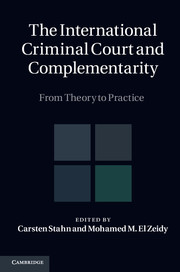Book contents
- Frontmatter
- Contents
- Acknowledgments
- Foreword by HE Judge Sang-Hyun Song
- Foreword by Patricia O’Brien
- Foreword by Silvia A. Fernandez de Gurmendi
- List of abbreviations
- Introduction: bridge over troubled waters?
- PART I General reflections
- PART II Origin and genesis of complementarity
- PART III Analytical dimensions of complementarity
- PART IV Interpretation and application
- PART IV (Continued) Interpretation and application
- PART V Complementarity in perspective
- 27 Horizontal complementarity
- 28 The International Criminal Tribunal for the former Yugoslavia (‘ICTY’) and the transfer of cases and materials to national judicial authorities: lessons in complementarity
- 29 Positive complementarity in practice
- 30 Complementarity of procedures: how to avoid reinventing the wheel
- PART VI Complementarity in practice
- Index
- References
27 - Horizontal complementarity
from PART V - Complementarity in perspective
Published online by Cambridge University Press: 05 November 2014
- Frontmatter
- Contents
- Acknowledgments
- Foreword by HE Judge Sang-Hyun Song
- Foreword by Patricia O’Brien
- Foreword by Silvia A. Fernandez de Gurmendi
- List of abbreviations
- Introduction: bridge over troubled waters?
- PART I General reflections
- PART II Origin and genesis of complementarity
- PART III Analytical dimensions of complementarity
- PART IV Interpretation and application
- PART IV (Continued) Interpretation and application
- PART V Complementarity in perspective
- 27 Horizontal complementarity
- 28 The International Criminal Tribunal for the former Yugoslavia (‘ICTY’) and the transfer of cases and materials to national judicial authorities: lessons in complementarity
- 29 Positive complementarity in practice
- 30 Complementarity of procedures: how to avoid reinventing the wheel
- PART VI Complementarity in practice
- Index
- References
Summary
This chapter tackles the question whether a subsidiarity/complementarity principle – as is set out in Article 17 of the Rome Statute of the International Criminal Court – governs domestic prosecutions for international crimes on the basis of universal jurisdiction (a ‘horizontal’ complementarity principle): are ‘bystander’ states that have no link with those crimes but nevertheless want to prosecute them required to defer to states that have a stronger link and that are able and willing to investigate and prosecute? The author derives from a discussion of six relevant elements of the international legal system that there is no strong legal requirement of horizontal complementarity. Nevertheless, it amounts to proper criminal policy to defer to ‘territorial’ states (states on the territory of which the crime has been committed) that intend to embark in good faith on their own investigations and prosecutions.
Introduction
The complementarity principle was established by the drafters of the Rome Statute. As such, it was designed for vertical application. Indeed, a supranational institution, the International Criminal Court (‘ICC’), would supervise the investigative and prosecutorial work of states, and assume its responsibilities if that work proved to be below acceptable standards. So far, however, scant attention has been paid to the horizontal dimension of complementarity. Horizontal complementarity, the term used in this contribution, refers to the complementary prosecutorial role played by ‘bystander’ states, i.e. those states that do not have a strong nexus with an international crime situation (and that are, for instance, exercising universal jurisdiction), vis-à-vis states that are directly concerned with such a situation, e.g. because the situation occurred on their territory or because the crimes were perpetrated by their nationals (hereinafter denoted as ‘the territorial/national state’ or, generically, as ‘the home state’).
Information
- Type
- Chapter
- Information
- The International Criminal Court and ComplementarityFrom Theory to Practice, pp. 855 - 887Publisher: Cambridge University PressPrint publication year: 2011
References
Accessibility standard: Unknown
Why this information is here
This section outlines the accessibility features of this content - including support for screen readers, full keyboard navigation and high-contrast display options. This may not be relevant for you.Accessibility Information
- 4
- Cited by
